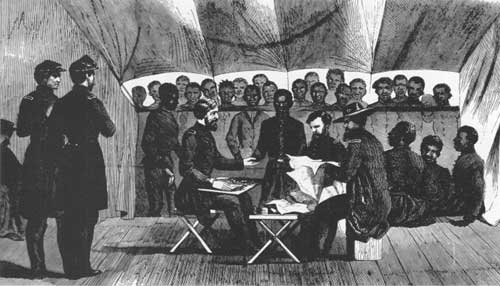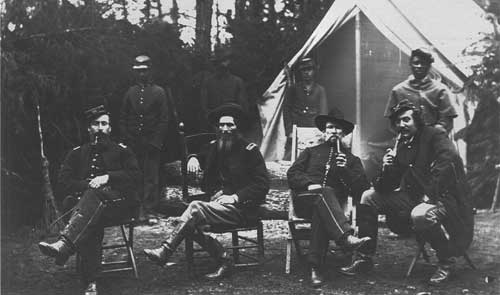|
PREJUDICIAL TREATMENT
Black soldiers rapidly discovered that donning the Union uniform was
an uplifting experience, but the sensation was transitory. Black
soldiers needed proof positive that the Federal government would treat
them the same as white soldiers. They hoped that this crisis and the
overwhelming response to it would convince the government to treat all
soldiers alike, regardless of skin pigmentation. Yet men of African
descent had experienced the extraordinary power of prejudice. They
needed some demonstration of good faith on the part of their government.
Unfortunately, such equal treatment was slow in coming.
At the time of their enlistment, the very first black recruits
received assurance that they would earn the same pay as white soldiers.
That quickly proved false. The War Department, after consultation with
legal counsel, announced on June 4, 1863, that the Militia Act of July
17, 1862, which authorized the enlistment of black men into the army,
specified that pay was to be $10 per month regardless of rank, $3 of
which was for clothing, the same pay as black government laborers. This
decision touched off a firestorm of controversy.

|
BLACK SOLDIERS RECEIVING THEIR PAY AT HILTON HEAD, SOUTH CAROLINA.
(FRANK LESLIE'S ILLUSTRATED NEWSPAPER)
|
Men in the 54th and 55th Massachusetts launched the protest by
refusing to accept inferior pay for equal work. Over the course of
eighteen months the government mustered the men for pay seven times. On
each occasion they declined it. When Governor Andrew of Massachusetts
proposed to provide the difference, they rejected the offer. It was not
the money, soldiers explained. It was the principle.
Black soldiers wrote to family, friends, newspapers, government
officials—anyone who would listen—complaining of this blatant
discrimination. In a letter to the editor of a prominent black
newspaper, an outraged soldier, fresh from the battlefield, demanded
equal pay for equal duty: "Do we not fill the same ranks? Do we not
cover the same space of ground? Do we not take up the same length of
ground in the grave-yard that others do? The ball does not miss the
black man and strike the white, nor the white and strike the black. But
sir, at that time there is no distinction made, they strike one as much
as another."
White officers in the USCT joined the chorus of protests. Powerful
Democrat and Major General Benjamin Butler could see no justification
for such discrimination: "The colored man fills an equal space in the
ranks while he lives and an equal grave when he falls." One lieutenant
even announced that if Congress did not address the pay inequality
question, he intended to resign: "I did not enter this service from any
mercenary motive but to assist in removing the unreasonable prejudice
against the colored race; and to contribute a share however small toward
making the negro an effective instrument in crushing out this unholy
rebellion."
When soldiers refused pay, their families suffered most. At least the
soldiers received meals and shelter. The family lost a primary wage
earner in the adult male. Frustration among black troops mounted
quickly, and grumbles progressed into mutinous words and occasionally
deeds. Officers tried their best to defuse the tense situation,
explaining the consequences of mutiny to their soldiers and urging them
to remain patient and work through the proper channels.

|
UNION OFFICERS WITH BLACK SOLDIERS IN THE BACKGROUND AT BRANDY STATION,
VIRGINIA. (LC)
|
Once supporters of equal pay mobilized their forces, they were able
to mount heavy pressure on national politicians. And in addition to
strong lobbying, important government officials began to side with the
black soldiers. The provost marshal general concluded that if the
government hired black men exclusively as laborers, then they could not
serve as substitutes for drafted white men. Attorney General Edward
Bates advised the president to pay black soldiers equal wages. Lincoln
had a constitutional obligation to apply all laws equally, Bates argued,
and in a court of law the government would most likely lose its case for
unequal pay.
In June 1864, Congress finally authorized equal pay for all soldiers
from January 1, 1864. But only African Americans free before the war
could receive equal pay before then. The furor resumed. It took another
nine months before Congress compensated all the victims of pay
discrimination. Even the euphoria over the passage of the Thirteenth
Amendment to the Constitution, which abolished slavery, did not remove
all the sting from such blatant inequality.
|
|
